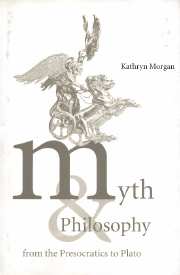Book contents
- Frontmatter
- Contents
- Acknowledgements
- 1 Introduction
- 2 Theoretical issues
- 3 Some Presocratics
- 4 The sophists and their contemporaries
- 5 The Protagoras: Platonic myth in the making
- 6 The range of Platonic myth
- 7 Plato: myth and the soul
- 8 Plato: myth and theory
- 9 Conclusion
- Bibliography
- Index of passages cited
- General index
6 - The range of Platonic myth
Published online by Cambridge University Press: 22 September 2009
- Frontmatter
- Contents
- Acknowledgements
- 1 Introduction
- 2 Theoretical issues
- 3 Some Presocratics
- 4 The sophists and their contemporaries
- 5 The Protagoras: Platonic myth in the making
- 6 The range of Platonic myth
- 7 Plato: myth and the soul
- 8 Plato: myth and theory
- 9 Conclusion
- Bibliography
- Index of passages cited
- General index
Summary
The sophists, as we have seen, blur the boundaries between mythos and logos. They use the former to illustrate the latter, and pretend to distinguish the two only to obscure the distinction. Given Plato's hostility to the sophists, we might expect that he would differentiate rigidly between the two and that his myths would be susceptible to easy definition. This is not the case however. This chapter, the first of three devoted to Platonic myth, will demonstrate that Platonic myth is characterised by subjectivity. By this I mean that myth lies in the eyes of the beholder and that this is connected with our nature as humans. We all fall short of philosophical knowledge, and few have the intellectual means to be aware of the status of the arguments and declarations we make. Like the sophists, Plato is aware of human fallibility, but the conclusion he draws from this is radically different. Whereas the sophists reacted with relativism and the acceptance and manipulation of social and linguistic convention, Plato wants us to work through our weakness towards secure knowledge. His belief in the immortality of the soul means that we have many lifetimes in which to achieve this. Our understanding of the status of myth is tied to context, in the broadest sense. Personal knowledge and the ability to explain it, the range and type of interlocutors present at any given conversation, the incarnation of the soul – all affect the authority of any statement.
Information
- Type
- Chapter
- Information
- Myth and Philosophy from the Presocratics to Plato , pp. 155 - 184Publisher: Cambridge University PressPrint publication year: 2000
